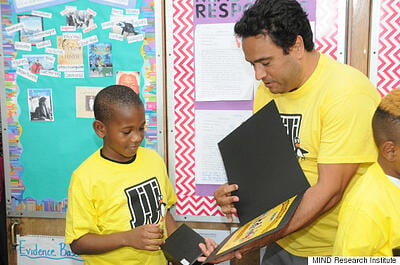
One of my students shared this powerful plea with me nine years ago:

I am this person lost in the world,
And don't know where to turn.
...Wanting to achieve in anything I do
I want to be treated like I exist.
I want to be seen for more than the outer me.
I want to be seen for the person placed inside of me.
I feel like I'm alone in the World.
I feel like there is no one out there in the world to run to when I feel like it's the end of me.
Sometimes I want to run away to a place where no one can hurt me.
Sometimes I feel like life for me will never go right. As much as I try, it will never go right.
What should I do if the problems I face won't come up from the deep, dark place inside me? Who should I turn to if I can't turn to the person that gave life to me?
Then who can I turn to?
This existential expression rings with alarming truth in an awakening society. It speaks for countless children in a woeful whirlwind of life.
As a former superintendent of the deceased Michael Brown Jr., and also the youngest and first African-American in Ferguson-Florissant in that leadership role, I intimately know this sentiment represents millions of economically disadvantaged youth, especially African-American males.
Nearly 70 percent of black children live in a single parent home, 40 percent of black children live in poverty, and 50 percent of black parents lack secure employment, according to the Annie E. Casey Foundation's Kids Count Data Book.
Honestly, it's better for a child like the one who wrote the poem above to be alone than partake in the plethora of poisonous options available such as drugs, violence and criminal gangs. Sadly, nearly one in three black males are in prison, on parole or probation, reports the Sentencing Project. Nearly half are likely to be drug users, according to the Centers for Disease Control. Every 24 hours, 14 black males expire from violence.
Simply put, for those who are living to die, the end is always near. For those who are dying to live, the question, "Who can you turn to?" is profound.
Hundreds of thousands of youth are alone -- not reached by talented, nurturing individuals. Who is willing to say, "I am someone you can turn to!"?
Triumphantly, my 9th grade student who shared that powerful plea made it through high school, attended a nationally recognized university, graduated and today helps others in need. Mentorship made a difference. This included time together, trips, tutelage, talking through life's trials and tough love.
We cannot always improve society for our youth, but we can improve our youth for society.
As a nonprofit social benefit organization dedicated to reaching all students, MIND Research Institute's new Initiative for African-American Males, referred to as I. A.M., demonstrates that we hear the pleas and see the plight of millions of unrepresented students. We stand collectively in support with such organizations as the White House Initiative on Educational Excellence for African Americans, and My Brother's Keeper.
I. A.M. aims to catalyze community and regional efforts and support comprehensive, cradle-to-college-and-career strategies through:
I. A.M. is about helping people grow.
A growing number of leaders and organizations are dedicated to saying, "I am here for you." Starting in my hometown of St. Louis, we are partnering with the Urban League's Save our Sons Program, the 100 Black Men for STEM and college assurance programming and the Boy Scouts of America's Restoring our Village Program.
As a nationwide organization that exists for social benefit, MIND Research has the means to dramatically impact high-needs students, in the quest to achieve our mission of ensuring that all students are mathematically equipped to solve the world's most challenging problems.
Some of the most challenging problems we face include:
Despite these disturbing statistics, youth can succeed -- with our help. All minds can be math minds. It takes the right teaching, tools and learning by doing deep thinking and problem solving. I. A.M. is one powerful vehicle for impacting students.
With expectancy, I look forward to that faithful day when these statistics are reversed and more than a supermajority of minorities can join all students and confidently say: I am equipped; I am available; I am in greater roles. I am a leader. Here I AM.
This article was orginally posted on Huffington Post Impact X.

Art McCoy, Ph.D., was Chief Academic Officer and Superintendent-in-Residence at MIND Research Institute. He is also the founder of Severing the Achievement Gap in Education of Students, SAGES, a consulting and professional development organization.
Comment